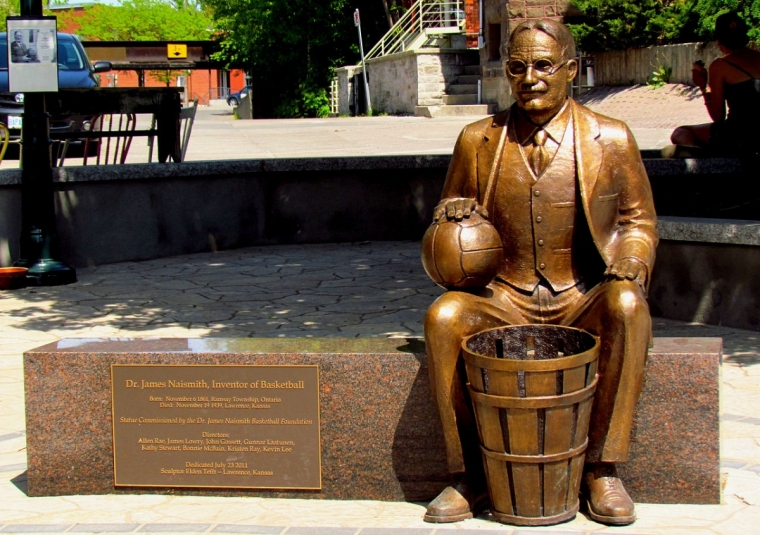Basketball inventor James Naismith hoped his work could 'win men for the Master'

SPRINGFIELD, Mass. (Christian Examiner)—As much of the nation turns its eyes this month to college basketball and March Madness, fans will watch a game its founder—an ordained Christian minister—intended, at least in part, as a missionary endeavor.
"Naismith's goals in life, as he stated on his application to the International YMCA Training School, were to try to help 'win men for the Master,' to build character and to be an example for the men," said Michael Zogby, a University of Kansas religion professor who has been doing research on the role of religion in the rise of basketball.
The game Naismith invented nearly 125 years ago at that YMCA has become nothing short of a global phenomenon.
The average NBA team is worth more than $1.5 billion. More than 400 million people globally follow the NBA, the highest professional level of the sport. The NCAA Basketball Championship tournament (aka "March Madness")—a 68-team, three-week maddening rush to crown a college champion— generated 350 million Twitter and Facebook impressions last year.
More than 60 million people—including President Barak Obama—filled out a bracket in an attempt to predict the eventual winner last year. An unimaginable 80.7 million people worldwide watched the tournament online last year through NCAA March Madness Live.
Yet the global Goliath that has become the game of basketball began with an unlikely, unassuming David.
Raised by his grandmother after he was orphaned at age 9, Naismith became a high-school dropout. After joining his uncle in the lumber industry, he became a regular patron at a local bar.
"Naismith’s goals in life, as he stated on his application to the International YMCA Training School, were to try to help 'win men for the Master,' to build character and to be an example for the men."
"The story in our family is he was at a bar on payday drinking too much," grandson Jim Naismith said of his now famous grandfather. "A man asked, 'Are you Margaret's son?' He said, 'Yes.' 'She'd roll over in her grave if she saw you now,' the man said."
That conversation became a transformational event for the Ontario, Canada, native. He went back to college and got a physical education degree and then a theological degree from Montreal's Presbyterian College.
Feeling like he could better serve God through physical education than a pulpit, Naismith moved to Springfield, Mass., in 1891 to become a graduate student and instructor at the International YMCA Training School.
When a blizzard rolled through New England in the winter of 1891, the school's students were stuck inside and acting out. The school's director asked Naismith to invent a game that could be played inside and would focus the energies of the school's young men.
"Something had to be done. One day I had an idea," Naismith told a New York radio station in 1939. "I called the boys to the gym and divided them into two teams of nine and gave them an old soccer ball. I showed them two peach baskets I had nailed at each end of the gym, and I told them the idea was to throw the ball into the other team's peach basket."
That part of the story is widely known. Zogby's research has shed light on the lesser-known religious connections to the story.
"Less well-known is that his game also was meant to help build Christian character and to inculcate certain values of the muscular Christian movement," Zogby said in a University of Kansas press release.
Made famous by President Teddy Roosevelt, "Muscular Christianity" was a movement particularly popular from 1880 to 1920 that tied physical health to "manliness" and spiritual health. At the core of Naismith's ministry was a commitment to developing the Christian character of young men.
"His approach was to put Christianity out there in front of people and try to influence them through positive character development, but he reserved his formal preaching for when he was a guest minister at area churches," Zogby said.
Seven years after he invented basketball, Naismith was hired by the University of Kansas, where he worked as its basketball coach, athletic director and teacher. To date he is the only University of Kansas coach with a losing record. Nearly all of the most significant coaches in 125 years of basketball history trace their coaching lineage back to Naismith, from Forest "Phog" Allen to Adolph Rupp to Dean Smith to Larry Brown to Greg Popovich.
Naismith also served as a U.S. Army chaplain during World War I, a service he continually placed at the top of his list of most significant accomplishments.
Late in life when Naismith penned the book "Basketball: Its Origin and Development" in 1941, Naismith appeared satisfied that the sport he invented a half century earlier had met the spiritual goals he originally set out for it.
Naismith wrote: "Whenever I witness games in a church league, I feel that my vision, almost half a century ago, of the time when the Christian people would recognize the true value of athletics, has become a reality."